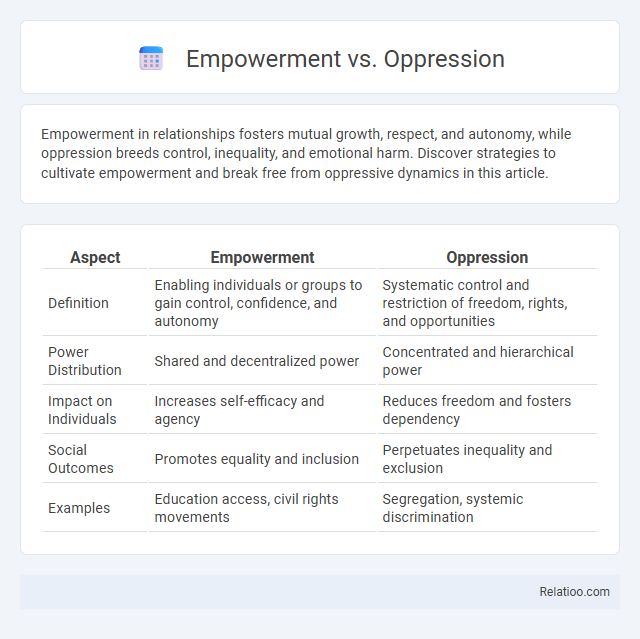Empowerment in relationships fosters mutual growth, respect, and autonomy, while oppression breeds control, inequality, and emotional harm. Discover strategies to cultivate empowerment and break free from oppressive dynamics in this article.
Table of Comparison
| Aspect | Empowerment | Oppression |
|---|---|---|
| Definition | Enabling individuals or groups to gain control, confidence, and autonomy | Systematic control and restriction of freedom, rights, and opportunities |
| Power Distribution | Shared and decentralized power | Concentrated and hierarchical power |
| Impact on Individuals | Increases self-efficacy and agency | Reduces freedom and fosters dependency |
| Social Outcomes | Promotes equality and inclusion | Perpetuates inequality and exclusion |
| Examples | Education access, civil rights movements | Segregation, systemic discrimination |
Understanding Empowerment: Definitions and Key Concepts
Understanding empowerment involves recognizing it as the process through which individuals gain confidence, access resources, and develop the ability to make decisions that influence their own lives. Empowerment contrasts sharply with oppression, where power is restricted and control is imposed, limiting your autonomy and opportunities. Permission often implies external approval, whereas true empowerment emerges internally, enabling sustained personal and social growth.
Oppression Unveiled: Forms and Mechanisms
Oppression manifests through systemic discrimination, social exclusion, and institutionalized power imbalances that restrict individuals' freedoms and opportunities. Hidden mechanisms such as cultural dominance, economic exploitation, and legal inequalities perpetuate cycles of marginalization. Understanding these dynamics equips you to recognize and challenge oppressive structures effectively.
Historical Context: Roots of Empowerment and Oppression
Historical context reveals empowerment as the ability of marginalized groups to gain agency and influence through social movements such as the Civil Rights Movement and women's suffrage. Oppression is rooted in systemic inequalities perpetuated by colonialism, slavery, and institutionalized discrimination that enforce control and limit freedoms. Permission, by contrast, is often granted selectively within power hierarchies, reinforcing existing social orders rather than challenging structural injustices.
Psychological Impact: Empowerment vs Oppression on Mental Health
Empowerment fosters resilience, self-efficacy, and positive mental health by promoting autonomy and personal growth, while oppression often leads to chronic stress, anxiety, and feelings of helplessness due to systemic limitations and enforced powerlessness. Your psychological well-being thrives in environments where empowerment replaces oppression, enabling you to build confidence and cope effectively with life's challenges. Studies show that empowerment reduces symptoms of depression and enhances emotional regulation, contrasting sharply with the adverse mental health outcomes linked to oppressive experiences.
Societal Structures: How Systems Empower or Oppress
Societal structures shape the distribution of power by either empowering individuals or perpetuating oppression through laws, policies, and cultural norms that control access to resources and opportunities. Your ability to influence change depends on these systems' design, which may grant permission for participation or restrict it through systemic barriers. Understanding how power dynamics operate within institutions is crucial for identifying pathways toward equity and transformation.
The Role of Education in Challenging Oppression
Education serves as a critical tool in challenging oppression by fostering critical thinking, promoting social awareness, and equipping individuals with the knowledge to recognize and resist systemic inequalities. Empowerment through education enables marginalized communities to assert their rights and challenge restrictive norms, while permission often reflects societal power dynamics that can either facilitate or hinder access to learning opportunities. By transforming curricula to include diverse perspectives and histories, education disrupts oppressive structures and cultivates a culture of equity and inclusion.
Empowerment Through Community and Collective Action
Empowerment through community and collective action fosters shared responsibility and amplifies marginalized voices, driving social change by uniting individuals around common goals. This approach counters oppression by building networks of support that challenge systemic inequalities and create opportunities for collective decision-making and resource sharing. Community empowerment transforms permission into proactive agency, enabling people to take control of their lives and influence policies that affect them.
Intersectionality: Overlapping Layers of Empowerment and Oppression
Intersectionality reveals how overlapping social identities such as race, gender, class, and sexuality create complex layers of both empowerment and oppression that shape Your experiences uniquely. Recognizing these intersecting factors allows for a deeper understanding of how permission is granted or denied within various social structures, influencing access to opportunities and resources. Analyzing the dynamic interplay between empowerment and oppression within these multiple dimensions is crucial for fostering inclusive policies and practices.
Strategies for Shifting from Oppression to Empowerment
Effective strategies for shifting from oppression to empowerment include fostering awareness through education on individual rights and systemic inequalities, creating safe spaces for open dialogue, and encouraging self-advocacy skills. Building supportive communities and leveraging resources for mental and emotional resilience further strengthen Your ability to challenge oppressive structures. Implementing inclusive policies and promoting equitable access to opportunities are critical steps in institutionalizing empowerment.
Inspiring Change: Real-World Stories of Empowerment
Empowerment fuels individuals to take control of their lives, transforming challenges into opportunities through self-belief and resilience. Stories of empowerment often showcase people breaking free from oppression, reclaiming their rights and dignity by defying systemic barriers. Your journey can mirror these real-world examples, inspiring change by embracing autonomy and rejecting limitations imposed by outdated power structures.

Infographic: Empowerment vs Oppression
 relatioo.com
relatioo.com